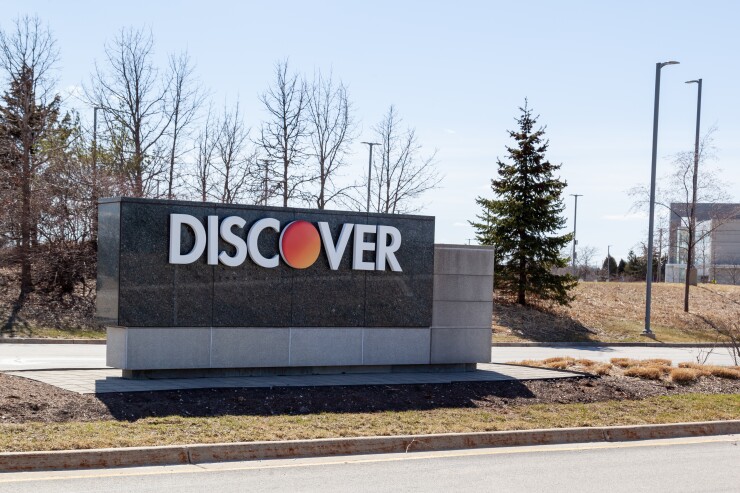
As Discover Financial Services clears its decks in anticipation of
The merchant fee-pricing issue costs more than Discover initially indicated when it revealed the missteps in July of 2023. At the time, the firm estimated that its liability for funds owed to merchants and acquirers would be
"After extensive discussions with several constituencies, including merchants and regulators, Discover decided to significantly increase our liability for the card misclassification issue," Discover's interim CEO, Michael Shepherd, told analysts during a call on Thursday to discuss the company's latest earnings. In a departure from tradition, most likely due to Discover's merger preparations, the firm did not entertain questions from analysts during or after the presentation.
Shepherd, who stepped in when newly appointed CEO
Due to the funds set aside for the merchant issue, Discover's net income for the quarter ended Jan. 31, 2024, was $309 million, down 68% from the same period a year earlier, said John Greene, Discover's chief financial officer. Revenue was $4.2 billion, beating analysts' expectations.
Discover's total loan growth rose 12% during the quarter compared with the same period a year earlier, while credit card loans rose 11% compared with the first quarter of 2023 and personal loans rose 21% during the comparable period.
"We are seeing strong uptake on our [personal loan] offering, as higher interest rates in cards can make debt consolidation more appealing for some consumers," Greene said, noting that about half of Discover's personal loan originations during the quarter were for debt consolidation, with disbursements going directly to consumers' creditors.
Discover continues to add new credit card accounts, but due to inflation, lower-income customers are curtailing their spending on groceries, gas and wholesale club purchases, Greene said.
Total loan charge-offs during the quarter reached 4.92%, up 220 basis points from the same period a year earlier, but credit card delinquency growth eased, rising 107 basis points over the year-earlier period, compared with a 134 basis-point increase in delinquencies between the third and fourth quarter of 2023.
Although Discover raked in $3 billion in consumer deposits during the first quarter, Greene expects to see a slowdown in that growth later this year. "We have started to decrease pricing on our deposit products ahead of any potential moves in [overall interest] rates," he said.
While Discover's credit card sales were down 1% during the quarter compared to the same period last year and the firm still expects to see flat-to-negative card sales growth this year, Discover's guidance for 2024 has changed from flat loan growth to an increase in the low-single digits, due to "modest" new-account growth and a higher proportion of consumers revolving card balances in a tighter economy, Greene said.
Discover also sees potential downward pressure on revenue from the Consumer Financial Protection Bureau's proposed cut in credit card late fees, which could amount to a pretax reduction of around $600 million or 4% of revenues, he said.
"Despite the good guidance update, we believe that Discover's share price will be driven by Capital One's share price performance and the market's assessment of the likelihood that the [merger] transaction closes," said Saul Martinez, head of U.S. Financials Research at HSBC Global Research in a Wednesday note to clients.






